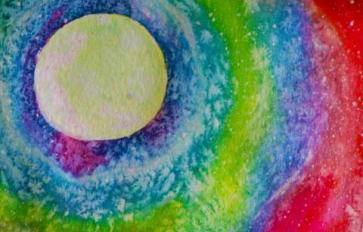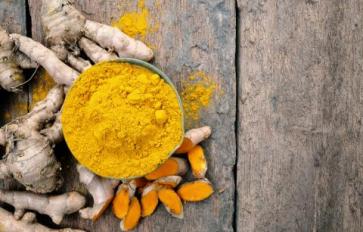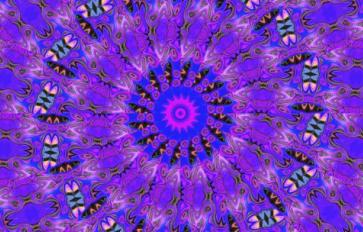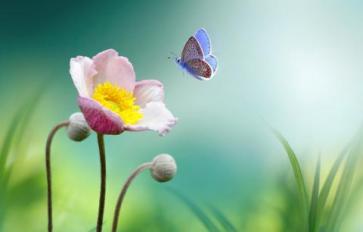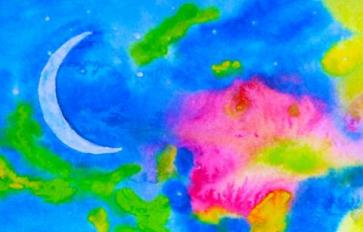
In Ayurvedic medicine there are three identified doshas, or basic constitutions: Vata (air), Pitta (fire) and Kapha (earth & water). A person is generally predominant in two doshas, sometimes one main one, though everyone contains all three in varying degrees. It is the goal of Ayurvedic practices and diet to balance the doshas, no matter which is more active, in order to bring a person into optimal health. In a relationship, there are also Ayurvedic doshas manifesting, which when understood and balanced, can be used as the approach to healing relational discord and bringing health to the union.
Let us look at the doshas in greater detail so it may then be examined how they show up in relationship and how balance might be achieved therein.
Do you know what your dominant dosha is? Take the quiz here.
The Doshas
Vata is the air element and rules mainly the mind, mental faculties, intellect, inspiration, the nervous system, joints and the way air moves through the body – including processes of elimination. When over-dominant, a Vata type can come off airy, “spacey,” wispy or ungrounded and may be bloated, gassy and anxious in nature. Under-active Vata types can suffer constipation, dull-mindedness, joint stiffness and pain like arthritis. People with a thin frame who have difficulty losing weight and tend to lack moisture in their system are usually predominantly Vata. This constitution balances out with sweets and warming, grounding foods such as grains, ginger, and nuts, and does not do as well with an overly raw-food based diet, which is gas-producing.
Pitta is the fire element and rules digestive fires, the circulatory system, passion and action and has a bearing on quick insights and passionate action – this type, in fact, craves action. Pitta is balanced by stillness, meditation, raw foods (which are cooling) and damp conditions. When over-stimulated, this type can tend to anger, impatience, being “hot-tempered,” domineering tendencies and destructive behaviors.
Chilies, coffee, ginger and other stimulating spices are considered “Pitta” foods, but are not necessarily good for Pitta-types. Pitta people benefit from pungent and bitter herbs as well as cooling foods like cucumbers, mint and apples. Pitta people are generally sporty, active and love the sun. They may tend to abhor the rain, but can thrive in such conditions if taken in moderation with the proper, balancing diet. Pitta people can usually gain and lose weight easily, have strong frames, and tan easily.
Kapha is a combination of the earth and water elements – kind of like mud – and rules mucous membranes, the fluids of the body, and the bones and overall structure. Kapha is grounded, slow, patient and enduring. A Kapha body might be stockier and hold more weight, and find it less easy to lose. Kapha is more apt to have allergies as mucous is a predominant fluid. These types of people tend to be stubborn and rooted, interested in practical, physical matters. Emotions may run high if imbalanced, though those emotions tend more toward tears and crying rather than anger.
Kapha foods are sticky, dense, wet and heavy, like porridge, stew, coconut milk and oils as well as meats and sweets, though Kapha people are better avoiding these things and using more pungent and bitter foods, lentils, light/dry foods and lots of vegetables. Kapha is stimulated by the Pitta spices and foods such as ginger, coffee and chilies. Kapha people can suffer from constipation, weight issues, attachment, lethargy and the tendency to get “stuck in their ways.” However, on the positive side, Kapha people are enduring, trustworthy, loyal and consistent when healthy.
Doshas in Relationship
In any relationship, all of the aforementioned elements are present to varying degrees. Though it matters what each person in the relationship brings to the table in terms of their personal dosha-constitution, other elements such as environment, climate and the way these elements play out between two people are worth considering as the imbalance of any dosha can greatly impede the relationship.
Even without knowing the individual doshas of each partner, if the two can work to balance and bring into harmony the relational doshas this will result in greater harmony in the union.
Vata in Relationships
Vata in relationships is communication; it is intellectual and spiritual compatibility. Vata must be harmonious in order for two people to thrive. Here is how healthy Vata shows up in relations:
- Good communicative skills using non-violent communication and compassionate understanding
- An equal or equivalent intellectual status
- Spiritual compatibility, as in a reasonably agreeable sense of what spirituality is to each person as well as an honoring of the other's path
- A lack of manipulation
- Sweet words and complimentary attitudes
- Mental connectivity and stimulating conversation
Vata rules the qualities of the astrological signs of Gemini – lending to multiple perspectives and mental acuteness. Vata also has a Mercury-type influence, showing up as a variety of communicative methods and styles.
If Vata conditions are out of whack or imbalanced, an “I'm right” argument can ensue, as well as belittlement, miscommunication and misunderstandings, spiritual disagreements and superiority power struggles.
How to Balance Vata in Relationships:
- “Sweet” words and compliments
- Seeing the good in the other person/emphasizing the positive
- Forgiveness
- Refraining from bringing up the past
- Honoring the other’s spiritual path
- Writing a letter to the other – gratitude-oriented, expressing thoughts
- Commitment to non-violent communication
Pitta in Relationships
Pitta is the fire, the passion, the inspiration and the drive in the union. It is the attraction-factor which must be present for two people to initially come together in intimate relation. Pitta manifests as the qualities of the fire signs in astrology of Aries, Leo and Sagittarius, as well as the Sun and its potency to burn through issues or cause potential harm. It can be hot and fiery, initiate new action, “show-off” and adore travel and change. However, Pitta can also burn through issues and the heart of the matter quickly if left unchecked, and can also be insensitive, sharp and self-absorbed or egotistical.
In order for Pitta to be in harmony the following must be true:
- An active, healthy sex-life/intimacy
- Engagement in similar interests/passions/crafts/sports, etc.
- Being inspiration for the other person
- Ability to digest experiences and ideas together harmoniously
- Honoring the other’s personality, interests and “alone time”
- Moving through change with understanding
If Pitta is imbalanced in the relationship it will show up as:
- Lack of sex drive/intimacy or an over-developed sex drive
- Anger or heated debates with a negative resolution or no resolution
- Misfires in where to put relational energy (two different directions)
- Failure to inspire the other person - “Bad taste in the mouth”
- Ego-battles and power struggles
How to Balance Pitta in Relationships:
- Take 10 seconds to “cool down” before addressing issues together
- Make intimacy a priority
- Infuse the relationship with “inspirational” methods such as poetry, romance, flowers, dates, flirtation, hand-holding etc. (“bring the passion back to the union” and “fan the flame” mentality)
- Work-out together and find other areas on which to “agree on direction” (cohesiveness)
- “Soothe” disagreements with kind words and “cool” things you both enjoy doing: common interests, inspirational sights, etc.
Kapha in Relationships
Kapha is the blood, sweat and tears, the “bones” and the structure of a union. It is the physical manifestation of the two, the house and home and the actual bond between two people. Kapha is the grounding force, the “reality check” and the exchange of energy and fluids that keeps two people bonded on a very hormonal, biological and physical level (such as kissing and sex). Kapha influences the surroundings and what grounds you both. It is the “ground” on which you meet one another.
Kapha manifests as the qualities of the astrological sign Taurus and Pisces – like stubbornness, and an affinity for beauty and fluidity -- and holds influences related to Saturn, such as boundaries, structure and time.
When Kapha is strong in a relationship it manifests as:
- Endurance and the willingness to go the distance with each other
- Practical agreements and a sense of humor about “mundane reality”
- Somewhere to call home
- Regular kissing and affection
- Structural agreements in the relationship such as “how it works” and “who does what”
Kapha is the practical reason for coming together and the force which guides its continuation forward. If Kapha is imbalanced in a relationship it might be expressed as:
- Instability – a constant “shifting” of the foundation/break-ups and restarts
- Nowhere to call home
- Fantasies and fears
- Discomfort with bodily fluids, expressions, or the “changing face” of the relationship
- Feeling the union is shaky and doomed to failure
How to Balance Kapha in Relationships:
- Having patience
- Stimulating/enduring elements such as life goals, dreams and potential projects
- Adding commitment – the “mud” of the union
- Sticking it out - “brick and mortar” - build the foundation – which may look like buying a home together, having children, thinking long-term/going the long-haul
- Getting “messy” with each other – be willing to “go through the mud” together without the fear of getting dirty or messing up your “personal style” or personal agenda
- Surrendering into the union and all it has to offer as it works through the blocks
By coming to know how the Ayurvedic doshas show up in a relationship, two people can learn to balance them out with relative ease and find their union strengthened because of it. If the doshas are out of whack between two people, the relationship could be considered sick. Even if you have two generally healthy people who have balanced doshas in their own bodies, they can still come together in an unbalanced way and manifest an unhealthy union. When this happens, and if left for too long, the relationship can suffer as if it is literally a sick person. When this happens, the two people can either let the relationship continue to suffer, and eventually die, or they can choose to heal the relationship by applying the necessary balancing elements of the ill-nurtured doshas.
By observing the elements playing out in a union and applying the appropriate dosha-remedies, Ayurvedic techniques can become a powerful tool to help heal relationship discords of every sort. As the whole world is made up of the interplay of elements, so is a relationship simply a dance of these things. In the dance of relationship it is beneficial to find natural solutions to bring harmony to what ought to be a joyful, evolutionary experience. Take a look at where your union might be out of balance and try some of these simple techniques to balance your relationship doshas today. And here's to a happy, healthy union.
"Ayurveda Massage Spa" by Sri Lanka Tourism is licensed by CC BY 2.0.



